I lined up outside the United Nations with some apprehension. I was about to view the opening of the acclaimed Israeli-Palestinian film Miral. Since I had rsvp’d to view the film, the Israeli government, as well as prominent U.S.-based Jewish groups including the American Jewish Committee and the Anti-Defamation League, had protested the showing – and I did not wish to participate in an anti-Israeli event.
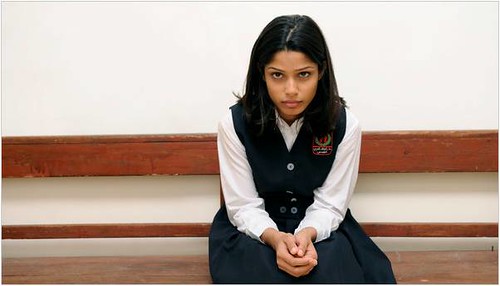
Freida Pinto plays Rula Jabreal in “Miral.” Photo courtesy of Weinstein Company.
The great U.N. General Assembly hall quickly filled to capacity – 1200 people sat through perhaps the first Palestinian-Israeli epic. I was delighted that the film was not anti-Israeli in the least – it was rather an extremely moving narrative of an orphaned girl, Israeli-Palestinian, set during the 1987 Palestinian uprising. It showed the horror of her childhood – from atrocities committed by both Palestinians and Israelis – and random acts of kindness from both that kept her alive.

Vanessa Redgrave, Hiam Abbass, and Willem Dafoe in Miral.
Photo courtesy of Weinstein Company.
The film, directed by Julian Schnabel and shot in Jerusalem and the West Bank, was deeply disturbing, thought-provoking, and incredibly poignant. Based on Julian’s film Basquiat, the biopic on the Haitian-American painter, Jean-Michel Basquiat (1996) whose life ended too soon, I had believed it would be. Miral is distributed by the Weinstein Company, who recently brought us another moving film, The King’s Speech.
Julian, raised in a Jewish family in Brooklyn by a mother that belonged to Hadassah, stated:
I love the State of Israel. I believe in it, and my film is about preserving it, not hurting it. Understanding is part of the Jewish way and Jewish people are supposed to be good listeners. But, if we don’t listen to the other side, we can never have peace. Instead of saying ‘no,’ I ask the A.J.C. to say ‘yes,’ see 'Miral' and join the discussion.
Julian is, in addition to a brilliant film director, an accomplished painter and sculptor. During his remarks at the General Assembly, he mused:
I never thought a Jewish guy would be the one to tell this story, but I need to, to allow myself to heal. If we listen to the other side, there might be a possibility of advancing peace.
I was particularly impressed with the President of the General Assembly, the Hon. Joseph Deiss of Switzerland, whom I wrote to compliment for his courage to host this cry for peace in Mideast from the eyes of Israeli-Palestinian orphan. It is obvious that 63 years of political diplomacy have not brought the world closer to a much-needed two-state solution. Perhaps the film Miral will have more influence than all of the diplomatic resolutions combined.
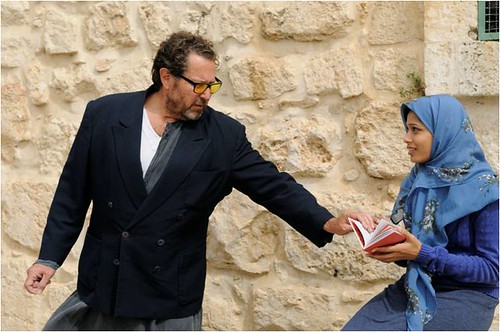
Julian Schnabel and Freida Pinto as Miral on location. Photo: Weinstein Company.
As founder of Orphans International Worldwide (OIWW), I have worked closely with former presidents of the General Assembly, including Father Miguel d’Escoto Brockman and H.E. Haya Rashed Al, but I had not yet dealt with the current General Assembly president, Joseph Deiss. I found the current president Joseph Deiss to be a man of extreme integrity.
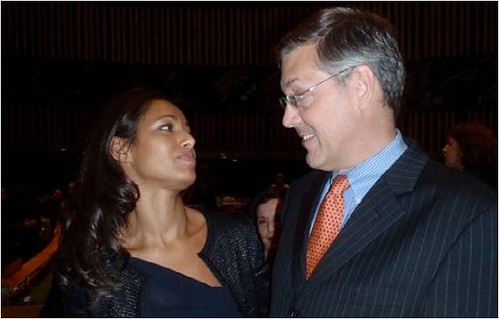
The gorgeous Rula Jabreal wrote the book the film is based on. Photo: John Lee.
The focus of the film is the childhood of a real woman, Rula Jebrealas, who attended the screening. She escaped a challenging upbringing on a scholarship to Italy, where she lives today. Rula said:
Miral is a story about human beings -- Palestinian, Israeli, Muslim, Jewish and Christian -- and it explores how we all react differently to the violence around us, whether physical, emotional, political, or otherwise. It is a film about love, education, understanding, and peace. That seems like a good thing to show at the United Nations.
Rula’s character was played brilliantly by Freida Pinto, known for her inspirational acting in Slumdog Millionaire.
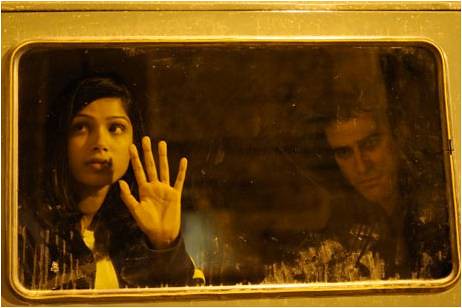
Freida Pinto stars in Julian Schnabel’s Miral. Courtesy of the Weinstein Company.
According to Rebecca Sacks in Vanity Fair:
Schnabel first met Jebreal at a party in 2007, when Schnabel was still married to his second wife, Olatz Lopez Garmendia. He was so impressed with the book (and its stunning author) that he was inspired to make the film. Schnabel and Jebreal promptly fell in love, and now live together at Palazzo Chupi, Schnabel’s famed pink-stucco Italo-condo in New York’s West Village.

The film Mirabel seems to be a Rorschach test for the viewer – if you are
pro-Israel or pro-Palestine, you see the film from your own perspective.
If you support both, as I do, you see it as a cry for peace in a land divided.
The atrocities portrayed are vivid and remain with the viewer, searing one’s consciousness: a Palestinian young woman being beaten by an Israeli prison guard, a Palestinian girl raped by her step-father, and the Israeli army demolishing a Palestinian home as the elderly residents weep.
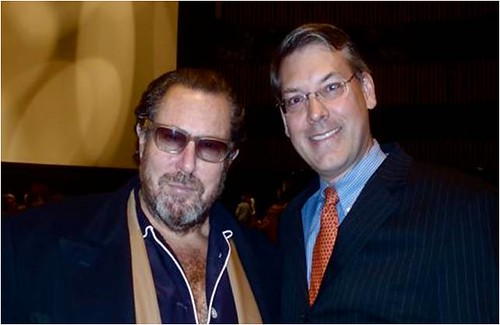
I spoke with Miral’s director Julian Schnabel following the screening. Photo John Lee.
Author Rula Jabreal explained her vision and hopes to Vanity Fair:
Jebreal is passionate on the topic of the film’s rating, explaining how Miral could be a tool for education, showing young women what it’s like to grow up amidst violence and fear. “Infotainment,” as Jebreal calls it. Miral is also being protested by some as anti-Israeli. “I simply wanted to tell my story and the story of my family. It’s not an accusation; it’s a love letter to my country and for many girls -- Israeli and Palestinian,” Jebreal says. “Education saved my life. I’m promoting peace and education.”
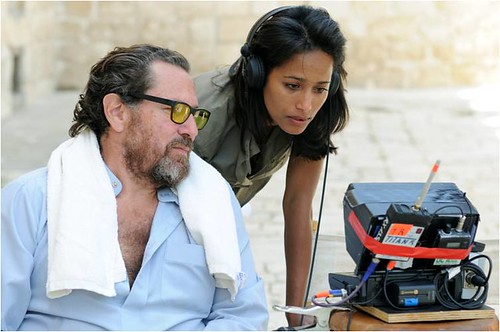
Julian Schnabel and Rula Jabreal on location. Photo: Weinstein Company.
The film opening attracted a plethora of Hollywood humanitarians, including Sean Penn, Robert De Niro, Vanessa Redgrave, Steve Buscemi, Harvey Weinstein, and Josh Brolin. One of my heroes, Dan Rather, MC’d the Q&A that followed the screening.
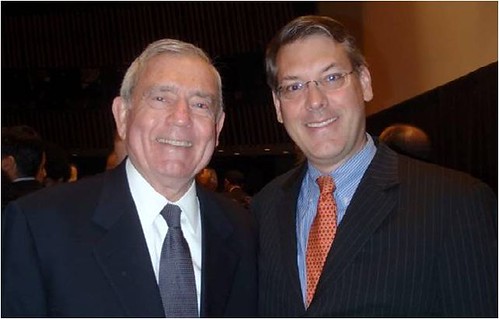
Dan Rather moderated the panel following the screening. Photo: John Lee.
Dan Rather, one of the preeminent television newscasters of our times, told me following the screening:
This is an incredibly moving film. It is a true story told in a medium that brings history to the screen. It is a hot-button issue film, as were Philadelphia and My Left Foot.
The panel discussion featured the director, the author, Rabbi Irwin Kula, journalist Mona Eltahawy, and Yonatan Shapira, co-founder of Combatants for Peace and was a former captain in the Israeli Air Force Reserves. Yonatan organized a group of pilots who refused to fly attack missions on Palestinian territories in 2003. Rabbi Irwin Kula, president of Clal, the National Jewish Center for Learning and Leadership, called the film a new form of peacemaking. “This is a meditation on empathy,” said this eighth-generation rabbi.
Rula Jabreal‘s book and now the film Miral concerns the vitality of education. An uneducated woman in Palestine has limited options, Rula believes, and either becomes a prostitute, or even worse, a suicide bomber. Education contains the seeds of rebellion. Miral, Julian Schnabel believes, could be a Tibetan, a Chechen, a Kurd, a Tutsi, or a Hutu.
Julian believes everyone has a story. “We need to hear these small, human stories more than we need to hear about the conflicts that surround them. We need to find empathy, for you cannot make peace without empathy,” he said.
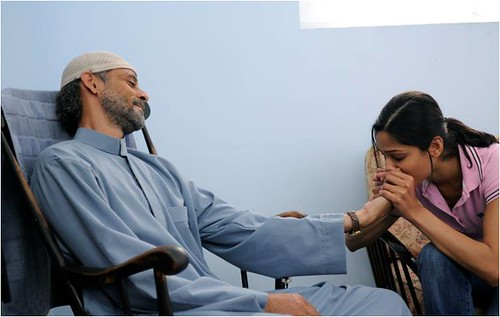
Freida Pinto as Miral with Alexander Siddig as her father. Photo: Weinstein Company.
From what I have seen of the world, I could not agree more strongly. The film is a mirror of evil in the world that can be overcome by education and tolerance. Rula Jabreal and Julian Schnabel are not anti-Israeli, but rather pro-humanity. They are true thought leaders and global citizens whose vision should inspire us all.
Miral was directed by Julian Schnabel; written by Rula Jabreal, based on her novel; director of photography, Eric Gautier; edited by Juliette Welfling; production design by Yoel Herzberg; produced by Jon Kilik; released by the Weinstein Company. Running time: 1 hour 52 minutes. With Hiam Abbass (Hind Husseini), Freida Pinto (Miral), Alexander Siddig (Jamal), Omar Metwally (Hani), Yasmine Al Massri (Nadia), Ruba Blal (Fatima), Willem Dafoe (Eddie), Vanessa Redgrave (Berta) and Stella Schnabel (Lisa).
See Stories by Jim Luce on:
Extremism | Film | Islam | Israel | Orphans | Palestine | Peace | U.N.


